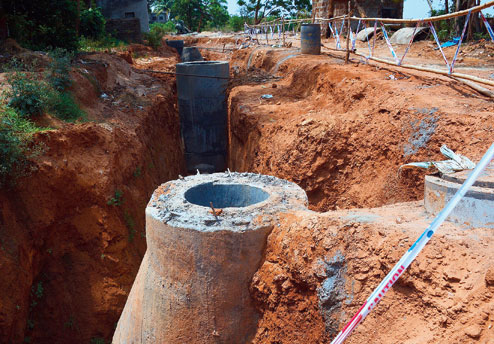
Construction of sewerage treatment system under way at Gadakana. Picture by Ashwinee Pati
Bhubaneswar, Oct. 11: The civic body has geared up to filter wastewater in a scientific manner before discharging it into peripheral drains and drainage channels across the city to avoid spread of various waterborne diseases.
To achieve the goal, the Bhubaneswar Municipal Corporation has come up with a sewerage management plan that envisages collection, transportation and treating them at four places across the city with installation of makeshift and portable mini sewage treatment plants.
The mini plants, to come up on 1,200sqft each, will be located at Jharpada, Gadakana, Ghatikia and Basuaghai. The civic body has selected a private partner for execution of the plants.
Civic officials held a review meeting for carrying out of fleet management of the cesspool vehicles yesterday where the proposal of Sainath Fabric Care Private Limited, a private sanitation agency, on the mobile plants was discussed and got the nod from councillors and other officials.
City engineer Dwaipayan Pattnaik said they had selected a private agency to manage wastewater. 'The firm has proposed the idea to set up the makeshift plants. We will give it land at four locations,' said Pattnaik.
The civic body will also sensitise all shops, hospitals, hotels, apartments and other major complexes, so that they hand over their sewage to the selected firm, which will then be transported to the plants for scientific treatment.
Waterborne diseases, mainly jaundice, remain a cause of concern for city residents. It spreads due to drinking water contamination caused the untreated faecal sludge is released into the open drains. The city had witnessed a jaundice outbreak last year when more than 50 persons of Jharana Sahi got affected by it in a fortnight.
'Earlier, faecal contamination had proved to be a major reason for jaundice outbreak. The sludge used to get mixed with drinking water and caused the disease. It can only be avoided if wastewater, mainly faecal sludge, is treated properly before being discharged into the open drains,' said health department special secretary K.C. Dash.
Sources said the corporation was also planning to involve traffic police for smooth movement of cesspool vehicles without any hindrance. According to the plan, the operation should start within two months. Moreover, the corporation has also decided to provide six cesspool vehicles to the private partner.
Officials said the need to set up the makeshift plants was felt after the Odisha Water Supply and Sewerage Board was found dragging its feet in laying underground sewer lines in the city. 'At some places, it is getting delayed because of land and other such administrative problems,' said a board official.
He said work on the first sewerage treatment plant at Kalinga Nagar had also been expedited, while efforts were on to complete the sewer line work by March next year. 'At many places, we are facing hurdles since the pipelines and underground cables are coming in the way of the sewer lines. We are clearing the hurdles in a phased manner and doing our job,' he said.
Environmentalists welcome the move regarding the proposed mini plants as they will help avoid health and environmental threats.
'Septage needs to be treated properly to avoid contamination of drinking water, pollution of river water and soil. It is a good move of the civic body to set up such plants,' said environmentalist Sailabala Padhi.










